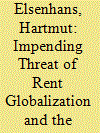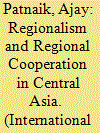|
|
|
Sort Order |
|
|
|
Items / Page
|
|
|
|
|
|
|
| Srl | Item |
| 1 |
ID:
167051


|
|
|
|
|
| Summary/Abstract |
The importance of an inclusive financial system in the overall growth and economic development of a nation is well recognized. While most studies on financial inclusion use supply-side data, this article presents a demand-side analysis of factors associated with financial inclusion. Making use of a large cross-country data on financial inclusion status and individual characteristics of adult individuals, we econometrically establish that individual characteristics and economic circumstances play very significant role in determining financial inclusion of adult individuals, after taking into account other factors of the country. The article uses three indicators of financial inclusion and several explanatory variables such as country-specific factor (gross domestic product [GDP] per capita), individual characteristics and individual economic circumstances of adult individuals from different countries. We find that in general, being woman, less educated, jobless and poor are negatively associated with financial inclusion of individuals. Enhanced level of education and income, in general, enhances likelihood of financial inclusion. These findings should be taken into account while formulating policies towards promotion of financial inclusion.
|
|
|
|
|
|
|
|
|
|
|
|
|
|
|
|
| 2 |
ID:
167047


|
|
|
|
|
| Summary/Abstract |
It is wrong that globalization necessarily leads to a world system where all participating economies are capitalist economies. Under the prevailing conditions of disempowerment of labour, capitalism is too weak to transform rent-based underdeveloped economies. Globalization is driven by currency devaluation, which transforms new comparative advantage into cost competitiveness. The major check on devaluation is full employment. It is often not achieved in countries engaging in devaluation-driven exports. In order to globalize capitalism, labour in the South would have to be empowered. At the theoretical level, a neoliberal understanding of capitalism as against Keynesianism blocks an understanding of the importance of mass consumption for maintaining capitalism. At the political level, mass movements where they exist in the South are captured by secular nationalism or cultural nationalism. An increasingly fragmented multipolar system emerges where governments promote rent seeking.
|
|
|
|
|
|
|
|
|
|
|
|
|
|
|
|
| 3 |
ID:
167053


|
|
|
|
|
| Summary/Abstract |
In South Asia, the movement of people and goods across borders is strictly controlled by states. However, there are some exceptions to these factors. India–Nepal border, for instance, is peaceful and porous with minimal restrictions on the movement of goods and people. Albeit there are times when border issues between these two friendly neighbours have taken a critical turn. One such recent border-related problem between India and Nepal was witnessed during the Madheshi movement. In 2015, an agitating section of the Madheshi community blocked the India–Nepal border. Due to the sociocultural proximity of Madheshi community with India, the blockade of the Indo-Nepal border has had repercussions on the bilateral ties. Conceptually, this article argues how border shapes relations between neighbours in South Asia. Empirically the recent blockade of the India–Nepal border is presented as an example to substantiate the primary argument of this article. There is also an attempt in this article to study the recent changes in the India–Nepal relations from the perspective of border studies.
|
|
|
|
|
|
|
|
|
|
|
|
|
|
|
|
| 4 |
ID:
167049


|
|
|
|
|
| Summary/Abstract |
Responding to a set of wicked problems pertaining to weak or failed states, state-building remains circumscribed by many of the problems it strives to address. Despite the expansion of literature, the challenging task of (re)building states in a postconflict setting is characterized by inadequate intellectual and policy coherence. Engaging with the existing literature, this article seeks to add clarity in ways that relate directly to the agendas of academic research and policy making. Casting into sharper relief what is distinctive and/or familiar in state formation processes in the West and the rest of the world, the analysis highlights the differing impact of nationalism. In considering the critique that contemporary international-led state-building neglects nation-building, the article suggests that the stateness of polities undergoing state-building is intrinsically linked with nationhood. State-building resides in both international and national locations of politics which condition the constitution of national identity via multiple (unequal) exchanges between external and local actors that can be depicted in terms of mimicry. Multiple political locations of state-building notwithstanding, the task of bringing the imagined community into being is more suited to national actors. Ongoing challenges of nation- and state-building require more acknowledgement that the realization of the nation cannot be a primary domain of international actors.
|
|
|
|
|
|
|
|
|
|
|
|
|
|
|
|
| 5 |
ID:
167046


|
|
|
|
|
| Summary/Abstract |
One of the most outstanding historical developments of the twentieth century was the gaining of national independence from imperial rule by most of the formerly colonized countries, especially in Africa, Asia and the Pacific. Yet, rather surprisingly, many of the leading contributors to postcolonial theory, including Edward Said, Gayatri Spivak, Homi Bhabha and others, tend to minimize the significance of national independence and take a dim view of the nationalist movements, leaders and ideologies that struggled for it. The aim of this article is to probe the reasons for this, canvassing postcolonial theorists’ main arguments and outlining certain intellectual currents and commitments, notably poststructuralism, deconstruction and postmodernism, that have contributed to these negative stances. Some counterarguments are presented, as it is suggested that the achievements of nationalist revolutions in the former colonies should be reassessed more favourably. This could be a way of resisting the current hegemonic power of the ideology of globalization.
|
|
|
|
|
|
|
|
|
|
|
|
|
|
|
|
| 6 |
ID:
167050


|
|
|
|
|
| Summary/Abstract |
In the post-Soviet period, Central Asia has lost the cohesiveness it had in the Soviet period. The states of the region have since been seeking outward linkages to pursue their economic and security interests. In the process, the relation between the Central Asian countries weakened and, in some cases, became adversarial. The nation-building process undertaken by the national leaders alienated ethnic minorities and neighbouring states. As a result, the regional mechanisms or organizations that have come up in the region are led or initiated by powers such as Russia, China and the USA. The competing interests of these powers have not helped in promoting cooperation among the Central Asia countries though some of these organizations are useful for member states. However, a new trend is visible since 2016 when a new leader became president in Uzbekistan. Improved bilateral relations and summits of leaders of the region create hope for a new regionalism in Central Asia that is based on the internal cooperative dynamics within the region. This may not replace the already existing mechanisms or organizations. However, the process itself is conducive for intra-regional cooperation and would be helpful in keeping the region free from the geopolitical competition of external powers.
|
|
|
|
|
|
|
|
|
|
|
|
|
|
|
|
| 7 |
ID:
167044


|
|
|
|
|
| Summary/Abstract |
To date, the US response to the Chinese Belt and Road Initiative (BRI) in Central Asia and the Caucasus has been calm, if not tacitly supportive. Two main reasons for this are: (a) the reopening of age-old east–west trade corridors as one of the most important legacies of the collapse of the USSR and (b) it views the engagement of both China and Europe in east–west trade across Central Asia as furthering the Central Asians’ own ability to achieve balanced and positive relations between all the major powers, thereby constraining hegemonic aspirations from any quarter. Further, the United States supports the emergence of Central Asia as a defined world region akin to ASEAN or the Nordic Council and believes that reforms under way in Uzbekistan and elsewhere in the region serve that end as well as increase east–west and west–east trade across the region. Finally, the United States realizes that the ultimate judgement on the viability of BRI in Central Asia and the Caucasus will be that of the market and not geopolitics.
|
|
|
|
|
|
|
|
|
|
|
|
|
|
|
|
|
|
|
|
|